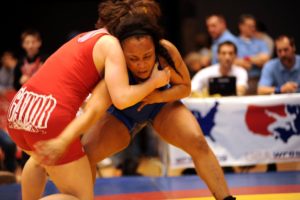- Calls to this hotline are currently being directed to Within Health, Fay or Eating Disorder Solutions
- Representatives are standing by 24/7 to help answer your questions
- All calls are confidential and HIPAA compliant
- There is no obligation or cost to call
- Eating Disorder Hope does not receive any commissions or fees dependent upon which provider you select
- Additional treatment providers are located on our directory or samhsa.gov
How Cutting Weight For Sports May Foster Disordered Eating

Athletes across the board are facing increasing competition on all levels, including high school, collegiate sports, professional athletics, and more.
It is not uncommon for athletes to engage in specific training regimens in order to optimize their athletic performance.
For the majority of athletes, this includes following a specialized diet and training protocol, usually advised by coaches and athletic trainers.
Depending on the sport, some athletes may feel that losing weight may help give them an athletic edge, but can this potentially do more damage than good?
Risk of Eating Disorders in Athletes
Eating disorders, such as anorexia nervosa, bulimia nervosa, and binge eating disorder, are severe psychiatric illnesses that are influenced by a variety of causes. According to one study that surveyed Division 1 NCAA athletes, over one-third of female athletes reported symptoms that placed them at increased risk for anorexia nervosa [1].
The reality is that many athletes of all gender types may be susceptible to developing an eating disorder, and the competitive nature of athletics can increase vulnerabilities to these mental health illnesses.
While certain sports or simply being an athlete itself cannot be “blamed” for an eating disorder, it is important to recognize the risk factors that may increase an athlete’s susceptibility to having an eating disorder.
Eating disorders are the result of biological, psychosocial and environmental factors. An athlete who may have a biological predisposition to eating disorders, such as genetic influences, may be more sensitive to athletic competition and the existing cultural prominence toward thinness. Certain sports that emphasize appearance or a particular body type can also increase risk factors for eating disorders in athletes [2].
This may include but is not limited to: gymnastics, long-distance running, bodybuilding, diving, dancing, wrestling and figure skating. Additionally, sports that emphasize the individual athlete versus an entire team can create more pressure on an athlete, increasing the probability of an athlete taking more extreme measures to excel in their performance.
Pressure to Lose Weight In Athletes
Various forms of disordered eating may occur in an athlete before a full-scale eating disorder develops; however, these should be viewed as red flags or indicators that show an athlete is in need of more help and support. One such indicator may be an athlete who is obsessive about their weight or beginning to take extreme measures to lose weight.
 In many situations, it may not be completely obvious that an athlete is attempting to lose weight.
In many situations, it may not be completely obvious that an athlete is attempting to lose weight.
Many athletes justify their behaviors in the name of training for their sport, and disordered eating behaviors can be disguised as dedication or commitment to athleticism.
Parents, coaches, trainers, and even fellow teammates can help support an athlete who may be struggling with eating disorder behaviors that could potentially put their lives at risk.
Athletes who may be attempting to lose weight may be engaging in disordered eating behaviors such as skipping meals, over-exercising, follow rigid food rules or cutting out entire food groups, avoiding social situations where food is involved, obsessing about calories, or hyper-focusing on their size, appearance, and shape.
An athlete who may be struggling with an eating disorder may display signs such as notable weight loss, frequent overuse inquiries and stress fractures, lack of concentration, energy, and stamina, and malnutrition. What may innocently begin as an attempt to excel in athletic performance can quickly lead to a more dangerous eating disorder in susceptible athletes.
Early Intervention and Awareness
With the pressure and stressors that many athletes are facing, weight loss may seem like a means of achieving a goal. However, for athletes who may already be susceptible to an eating disorder, this can be a dangerous behavior that leads to more serious issues.
 The National Eating Disorder Association offers a Coach and Athletic Toolkit that can help staff and professionals who frequently work with athletes and who want to know how to support an athlete who may potentially be dealing with an eating disorder [3].
The National Eating Disorder Association offers a Coach and Athletic Toolkit that can help staff and professionals who frequently work with athletes and who want to know how to support an athlete who may potentially be dealing with an eating disorder [3].
Awareness about disordered eating behaviors, such as obsessiveness about body shape or weight loss, can help with early intervention.
Athletes who are surrounded by teammates, coaches and other staff who are supportive, informed, and aware of disordered eating behaviors can help intervene when dangerous measures are taken in athletics.
Contrary to many myths about athletes and eating disorders, dieting and weight loss does not need to be part of the equation in order for an athlete to be successful in their sport.
 About the Author: Crystal Karges, MS, RDN, IBCLC is a Contributing Writer for Eating Disorder Hope.
About the Author: Crystal Karges, MS, RDN, IBCLC is a Contributing Writer for Eating Disorder Hope.
Crystal is a Masters-level Registered Dietitian Nutritionist (RDN) with a specialty focus in eating disorders, maternal/child health and wellness, and intuitive eating. Combining clinical experience with a love of social media and writing. As a Certified Intuitive Eating Counselor, Crystal has dedicated her career to helping others establish a healthy relationship with food and body through her work with EDH and nutrition private practice.
References:
[1]: NCAA, “Disordered Eating in Student-Athletes: Understanding the Basics and What We Can Do About It”, http://www.ncaa.org/health-and-safety/nutrition-and-performance/disordered-eating-student-athletes-understanding-basics Accessed 14 July 2017[2]: The National Eating Disorder Association, “Athletes and Eating Disorders”, https://www.nationaleatingdisorders.org/athletes-and-eating-disorders Accessed 14 July 2017
[3]: National Eating Disorder Association, “Coach and Athletic Trainer Toolkit”, https://www.nationaleatingdisorders.org/coach-trainer Accessed 14 July 2017
The opinions and views of our guest contributors are shared to provide a broad perspective of eating disorders. These are not necessarily the views of Eating Disorder Hope, but an effort to offer discussion of various issues by different concerned individuals.
We at Eating Disorder Hope understand that eating disorders result from a combination of environmental and genetic factors. If you or a loved one are suffering from an eating disorder, please know that there is hope for you, and seek immediate professional help.
Published on September 18, 2017.
Reviewed By: Jacquelyn Ekern, MS, LPC on September 18, 2017.
Published on EatingDisorderHope.com
Baxter Ekern is the President of Eating Disorder Hope. He is responsible for the management and operations of Eating Disorder Hope. Baxter has been lending his services to Eating Disorder Hope for several years but came on board as the full-time president in November 2016.

